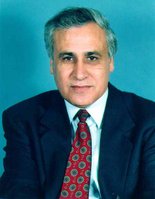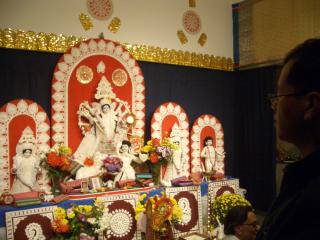A dummy's guide to a "different" Iran
By Angus McDowall
From The Independent, 30 October 2005
Most TV news reports about Iran depict religious revolutionaries who promote militancy abroad and suppress human rights at home. But this is only part of the story:
1 Art-house Iranian films by such directors as Abbas Kiarostami and Mohsen Makhmalbaf wow foreign audiences. But the domestic film industry also churns out hundreds of more popular pictures. Last year's big hit The Lizard, drew the clerics' wrath for depicting a convict escaping prison disguised as a mullah. This year's hit was Girls' Dormitory, about a psychotic killer terrorising students.
2 In the form of Shia Islam practised in Iran, Muslims are allowed to enter into temporary marriages with each other, sometimes lasting only a few hours. Critics say this in effect legalises prostitution, and women who enter into these sigheh contracts are often ostracised. But the practice is defended as a legal loophole to provide inheritance rights for children who would otherwise be born out of wedlock. Sigheh websites have been set up to offer advice to prospective brides and grooms.
3 More than 3,600 Iranians have been killed in the past 25 years fighting heroin smugglers, whose main trade route to the West passes through the Islamic republic. Iran itself has a major drug problem, with more than two million addicts. The government has permitted radical measures to tackle the problem, including methadone programmes and syringe hand-outs to prevent the spread of disease.
4 Transsexuals are permitted to have sex-change operations in Iran by the decree of Ayatollah Ruhollah Khomeini himself. The founder of the Islamic republic passed a fatwa allowing one transsexual woman to have the operation because sexual ambiguity made it impossible for her to carry out her religious duties properly. Iran now has dozens of people who have had a sex change.
5 According to the UNHCR, Iran hosts more than one million foreign refugees - more than any other country on earth. Most of these are Afghans and Iraqi Kurds, who fled their countries during the 1980s and '90s. Iran has in the past spent millions providing them with social security but in return it has acquired a huge workforce prepared to do manual labour for rock-bottom wages.
6 While official dress codes are very strict, many young Iranians delight in pushing back the boundaries of what is acceptable. Teenage girls in Tehran wear the most vestigial of see-through headscarves and tight overcoats that barely cover the bottom. This season gypsy-style scarves are in, featuring traditional Turkmen floral designs. Cosmetic surgery is all the rage, with girls proudly displaying a plaster to show their nose has recently been "fixed".
7 Skiing is a major pastime in mountainous parts of Iran, with pistes that rival those in Alpine resorts. Every winter young Iranians flock to the main slopes near Tehran, where social mores are less tightly enforced. Iran also has cricket, baseball and women's rugby teams, but football remains the most popular sport.
8 Iran has one of the only condom factories in the Middle East, and actively encourages contraception as a means of family planning. Sex education for married couples and major advertising campaigns helped Iran to slow its booming population growth.
9 Satellite television is banned in Iran, but receiver dishes sit in plain view on top of many houses. The most popular channels are run by Iranians based in Los Angeles, who broadcast Iranian pop music and a steady stream of anti-regime propaganda - though many Iranians also scoff at the radical tone taken by the stations.
10 Iran is one of the world's biggest producers of luxury foods. The country has rights to fish more sturgeon - the source of caviar - than any other Caspian Sea nation because of its extensive restocking programmes. It is also the world's biggest producer of pistachios, as well as saffron.






